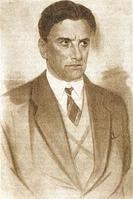| Vladimir Vladimirovich Mayakovsky | |||||
| 弗拉基米尔·弗拉基米罗维奇·马雅可夫斯基 | |||||
阅读马雅可夫斯基 Vladimir Mayakovsky在诗海的作品!!! | |||||
著名的俄国诗人,出生在格鲁吉亚山区的巴格达吉村的一个林务官的家庭。他童年时代就喜欢文学。1906年随全家迁居莫斯科,不久即开始从事革命活动。
1911年,马雅可夫斯基进入莫斯科绘画雕刻建筑学校,并开始写诗,早期诗歌具有未来派的色彩。长诗《穿裤子的云》(1915)是-部爱情诗,但其基调是批判资本主义。
十月革命后,马雅可夫斯基的创作进入一个新时期。他写出了短诗《我们的进行曲》(1917)、《革命颂》(1918)和《向左进行曲》(1918), 以及剧本《宗教滑稽剧》(1918)和长诗《一亿五千万》(1921)等许多歌颂革命的作品。1919年至1922年期间,马雅可夫斯基为俄罗斯电讯社的"罗斯塔之窗"工作,他作的诗画题材广泛,简洁鲜明,颇受群众欢迎。他的讽刺诗《开会迷》(1922)辛辣地讽刺了官僚主义和文牍主义。
1924年以后,他的创作进入成熟期,先后发表了长诗《列宁》(1925)和《好!》 (1927),长诗序曲《放开喉咙歌唱》(1930),讽刺喜剧《臭虫》(1928)和《澡堂》(1929),以及美国组诗和特写《我发现了美洲》等。长诗《列宁》从正面描写列宁的光辉一生,描写群众对列宁的深厚感情。他的喜剧讽刺了小市民及揭露了官僚主义,并在戏剧艺术上有创新。
由于长期受到宗派主义的打击,加上爱情遭遇的挫折,诗人开枪自杀,身后留下13卷诗文
Vladimir Vladimirovich Mayakovsky (/ˌmɑːjəˈkɔːfski, -ˈkɒf-/; Russian: Влади́мир Влади́мирович Маяко́вский; 19 July [O.S. 7 July] 1893 – 14 April 1930) was a Soviet poet, playwright, artist, and actor.
During his early, pre-Revolution period leading into 1917, Mayakovsky became renowned as a prominent figure of the Russian Futurist movement, being among the signers of the Futurist manifesto, A Slap in the Face of Public Taste (1913), and writing such poems as "A Cloud in Trousers" (1915) and "Backbone Flute" (1916). Mayakovsky produced a large and diverse body of work during the course of his career: he wrote poems, wrote and directed plays, appeared in films, edited the art journal LEF, and created agitprop posters in support of the Communist Party during the Russian Civil War. Though Mayakovsky's work regularly demonstrated ideological and patriotic support for the ideology of the Communist Party and a strong admiration of Vladimir Lenin, Mayakovsky's relationship with the Soviet state was always complex and often tumultuous. Mayakovsky often found himself engaged in confrontation with the increasing involvement of the Soviet State in cultural censorship and the development of the State doctrine of Socialist realism. Works that contained criticism or satire of aspects of the Soviet system, such as the poem "Talking With the Taxman About Poetry" (1926), and the plays The Bedbug (1929) and The Bathhouse (1929), were met with scorn by the Soviet state and literary establishment.
In 1930 Mayakovsky committed suicide. Even after death his relationship with the Soviet state remained unsteady. Though Mayakovsky had previously been harshly criticized by Soviet governmental bodies such as the Russian Association of Proletarian Writers (RAPP), Premier Joseph Stalin described Mayakovsky after his death as "the best and the most talented poet of our Soviet epoch."
